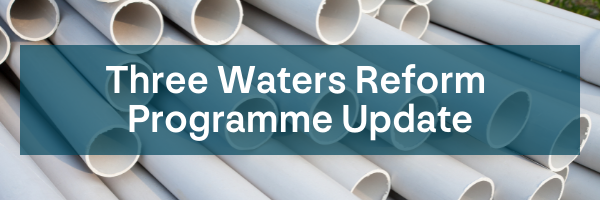| Three Waters Update – March 2022
Tēnā koe, The Department continues to work in partnership with the local government sector, iwi/Māori and industry stakeholders to progress the reform proposals and to engage as part of the establishment and transition process for the new water services entities. |
| Update on the three Working Groups
On 9 March, the Representation, Governance and Accountability Working Group released their report which recommended a suite of measures to strengthen the governance and accountability arrangements, and to ensure strong accountability back to the communities they will serve. The Working Group heard from a range of groups about their views on the Government’s proposals, including several alternative models. The Group engaged in energetic debate and argument and formed their recommendations by consensus. The recommendations fall into three broad groupings: · Support for significant changes to the Bill; · Specific recommendations for material improvements to the new water services entities and delivery of services; and · Other considerations outside their terms of reference. You can read the Working Group’s full report here Governance-Working-Group-Report.pdf (dia.govt.nz) The Minister of Local Government and Cabinet will consider the Working Group’s recommendations shortly, with any recommended changes agreed by Cabinet being reflected in the upcoming Water Services Entities Bill. The Department has also established two other technical working groups to address feedback received in the eight-week engagement period. |
| The Rural Supplies Technical Working Group has met four times since it was established in late January 2022. The group have considered a range of topics as they relate to rural supplies and rural marae and papakāinga.
Case studies from rural supplies across the motu are being examined to tease out common themes and issues to be considered in the development of legislation. The group will provide advice to the Department in early April 2022. In addition, this group is providing insights for consideration by Taumata Arowai regarding the implementation of regulations under the Water Services Act. The Planning Technical Working Group held its first meeting this week. Members include those with planning experience at senior levels across a range of local authorities, as well as those who bring a Te ao Māori perspective to planning. You can find our more about all three working groups, including their Terms of Reference and papers here: three waters reform programme working groups – dia.govt.nz |
| New appointments to the Department’s Three Waters Leadership
Hamiora Bowkett (Ngāti Rangiwewehi, Te Arawa, Te Rarawa) has joined the Department as the Executive Director of the reform programme overseeing the ongoing policy development and upcoming legislative programme. Hamiora brings with him 21 years’ experience from across the public and private sectors, joining the team most recently from Te Puni Kōkiri, where he was Deputy Secretary Strategy, Finance and Performance. Heather Shotter will also join the reform leadership, heading up the National Transition Unit responsible for establishing the four new water services entities. Heather brings proven expertise in managing complex transitions and delivering well-balanced outcomes across the public, for-profit and not-for-profit sectors that are invaluable for the Transition Unit’s work ahead. In her previous role as Palmerston North City Council Chief Executive, Heather was a member of the Joint Central/Local Government Three Waters Steering Group and Local Government Infrastructure Reference Group. Maria Nepia (Ngāti Tūwharetoa, Rākaipaaka) has been appointed as acting Executive Director, Three Waters Iwi/Māori. This new position signals the role iwi/Māori will play in the Three Waters programme and across the Local Government system. Maria is a Partnership Director for the Department and will continue in this role as well. |
| Letters to Councils
The Department recently provided responses to detailed feedback and questions submitted through the eight-week period last year. We would like to thank everyone for their input. This feedback has been extremely valuable and continues to influence the shape of the reforms. Since October 2021, this feedback has seen a number of changes to the reform proposals and processes including the establishment of the working groups discussed earlier in this newsletter. In addition, the National Transition Unit has increased its engagement with local government, iwi/hapū and the water industry and begun undertaking early transition activities. |
| National Transition Unit (NTU) – Webinars
The Three Waters NTU has begun a series of webinars to update local government, iwi/Māori and others on progress with the reforms. The first webinar in late February looked at the requests for information that will be sent to councils during the year, and presenting the deliverables across the varied workstream areas for the remainder of the year. View the slide deck from this webinar. Council employees who currently work on water services are critical to the success of the transition, so our second webinar looked at the People and Workforce workstream. Watch the People and Workforce webinar. All future webinars will be available on the NTU webpage national transition unit three waters reform programme – dia.govt.nz within a few days of their completion. |
|
Ngā mihi, |
